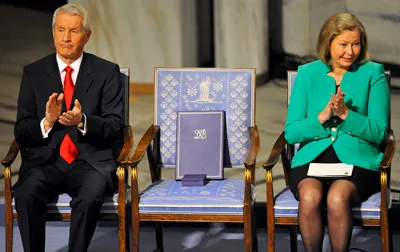It was more than Liu Xiaobo’s chair that was empty at Thursday’s Nobel Peace Prize ceremony. What was also on display to the world was China’s lack of a new approach to media that goes beyond its decades-old approach of controlling through denial and suppression.
On the global stage provided in Oslo, China showed itself in 2010 to be no more advanced than China under Mao in the 1950s. And this from a country with more people now online than there are in all of the United States’s population, as Chinese journalists increasingly assert their rights to cover news and not fear intimidation, and with new digital platforms like increasingly smart mobile phones that can circumvent censors’ controls. That the part of China’s bureaucracy committed to controlling news and information could come up with nothing more than a blackout of the award ceremony in Oslo and shrill denunciations shows what level China is playing at, and it’s not all that high.
The ideologically hard-line bureaucrats at the Central Propaganda Department had prepared no counter-messages. Despite months of advance warning, they had come up with no way of disarming what was, for their country, an international public relations disaster. Their attempt at launching their own counter-Nobel ceremony–the Confucius Peace Prize, awarded to former Taiwanese Vice President Lien Chan, who declined to show up, and said he hadn’t been informed that he had won–was, by all reports, a sad, ad hoc affair with a 6-year-old girl accepting the award. A young girl: Was she supposed to represent the country’s hopes and aspirations for a peaceful future? Or was she used as an innocuous innocent, one sure not to say anything that would further distress the government? Given the paucity of the rest of the government’s response to Liu’s award, it seems safe to assume she represented the level of media awareness at which the government wants to keep the rest of her countrymen.
The people who control China’s media and the people who give them the orders to do so came up with nothing broader or wiser than to repeatedly denounce Liu as a criminal, ramp up a crackdown on dissident voices, and denounce the Nobel committee as “clowns” and accuse them of “orchestrating an anti-China farce.” China’s greatest success in Oslo, for what it was worth, was to put the diplomatic squeeze on a few partners of convenience–19 countries did not attend the ceremony, apparently under pressure from China’s Foreign Ministry.
This approach comes from people who are capable of an annual display of national military and economic prowess every May Day. People who control an economy that is bringing increasing wealth to more people at a faster rate than ever seen before anywhere in the world. From a country that has already stepped up to assume a major role in world events.
But they are also the people who could come up with no other response to the criticisms of their country by Liu Xiaobo than to send him to prison for a 11 years and do everything in their power from letting their countrymen know about it. For all its growing power, China is a country that is running out of new ideas.
